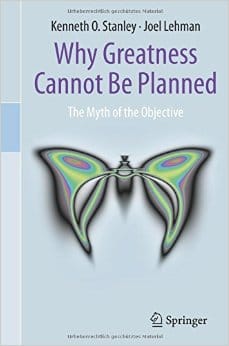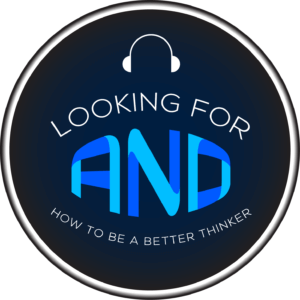If you are like most people, you have at least a couple of goals. Some of these goals may even be explicit, written down and follow the SMART model (Specific Measurable Achievable Relevant Time-bound). For instance, you may have written down that your goal is to lose five pounds by November 1 so that you can enjoy the holiday season. Bigger goals (eg; getting promoted, launching a successful company, curing cancer) may also follow the SMART model. Before you write down one specific goal, however, consider this – objectives just might make you less likely to achieve what you set out to do.
Kenneth Stanley and Joel Lehman, two researchers in the field of artificial intelligence (AI), argue that using objectives for  “ambitious” goals is a trap. In Why Greatness Cannot Be Planned – The Myth of the Objective, the authors set out to convince us that simply being curious and allowing for serendipity will lead us to great discoveries.
“ambitious” goals is a trap. In Why Greatness Cannot Be Planned – The Myth of the Objective, the authors set out to convince us that simply being curious and allowing for serendipity will lead us to great discoveries.
Limitless clean energy, teleportation, a cure for cancer and true artificial intelligence are examples of several ambitious goals. We are more than several important discoveries away from solving these problems and simply having objectives, the authors argue, would hamper our progress. Take ENIAC, for instance, the first general purpose computer developed at the University of Pennsylvania. The men and women who built this incredible feat of engineering were reliant upon the invention of the vacuum tube, which was invented to control the amount of electricity that flowed from one place to another. If a human being had the ambitious goal of creating the first electronic computer 5,000 years ago, it would have been impossible. Without the “stepping stone” of the vacuum tube, the computer simply does not happen.
Stepping stones, they argue, are more likely to be discovered through serendipity. And, discovery is more likely when scientists and entrepreneurs are interested in what they’re working on. That is, when the target is novelty, the researcher is simply following the path of interest. And, when we follow our path of interest, we spend more time on the problem and invest more energy in the process because we have more energy to bring to our tasks. Obstacles become challenges and results follow. In one study cited by the authors, almost 2/3 of people attributed their career choice to serendipity. (In a conversation with a friend just the other day, he and I agreed that our careers were a result of the both of us following what was interesting and motivating.)
Citing another study by British psychologist Richard Wiseman, the authors say that objectives can blind us to solutions that don’t fit our mental formula for achieving the objective. In the study, Wiseman directed participants to count the number of photographs in a newspaper. Those who focused only on the goal of counting the pictures actually took much longer to complete this task than those who were less focused on the objective. It turns out that Wiseman wrote a note on page two of the newspaper that read, “Stop counting: There are 43 photographs in this newspaper.” Focusing too heavily on the goal can prevent us from seeing information that we may find useful in our pursuits.
 Finally, metrics can cause problems for ambitious goals, as well. Imagine that you are trying to measure your progress while completing a maze. If we use the wrong metric, we might never find the solution. A maze is a great metaphor for an ambitious goal in that measuring progress as linear distance from the solution would have us following the wrong path. To complete a difficult maze, you will need to move in a direction opposite to the solution, at times. False metrics may lead us astray. Novelty steers us away from where we have already been and helps us make new discoveries..
Finally, metrics can cause problems for ambitious goals, as well. Imagine that you are trying to measure your progress while completing a maze. If we use the wrong metric, we might never find the solution. A maze is a great metaphor for an ambitious goal in that measuring progress as linear distance from the solution would have us following the wrong path. To complete a difficult maze, you will need to move in a direction opposite to the solution, at times. False metrics may lead us astray. Novelty steers us away from where we have already been and helps us make new discoveries..
In the end, the authors do offer several compelling arguments for considering the dangers of objectives. Abandoning objectives (even for ambitious goals) seems incredibly risky for me as an executive coach and consultant. Goals can be motivating and performancing enhancing. Without them, individuals would have difficulty determining what to work on, how much effort to apply and how to prioritize. Teams, in turn, would have trouble coordinating their activities and deciding how to allocate their resources.
As my good friend and colleague Anne Loehr recently said to me, recently, “This sounds like a polarity issue.” That is, let’s stop thinking of it as, “Goals are either good or bad.” If we use goals as a structure to help us think, plan and find meaning, they can help us achieve greatness. When pursuing a goal, be ready be open to new experiences, information and ways of thinking that might seem to take you in an opposite direction. If you do this, you just might find the stepping stones to the career you have always wanted, the partner of your dreams or curing cancer.
[polldaddy poll=9112077]



